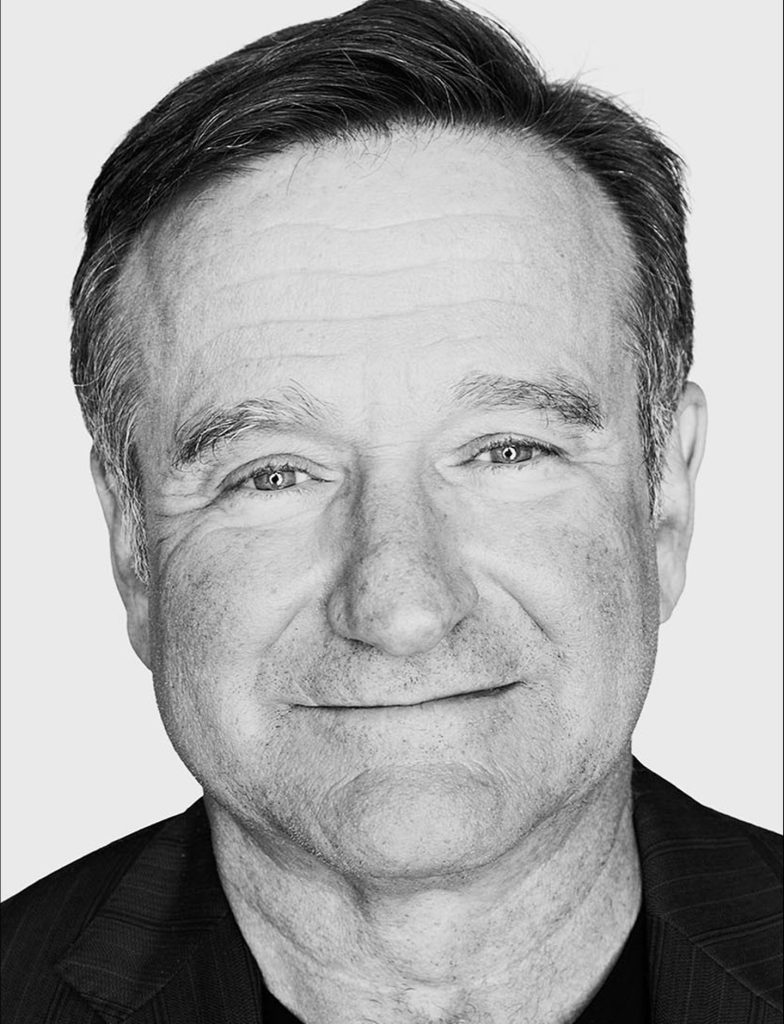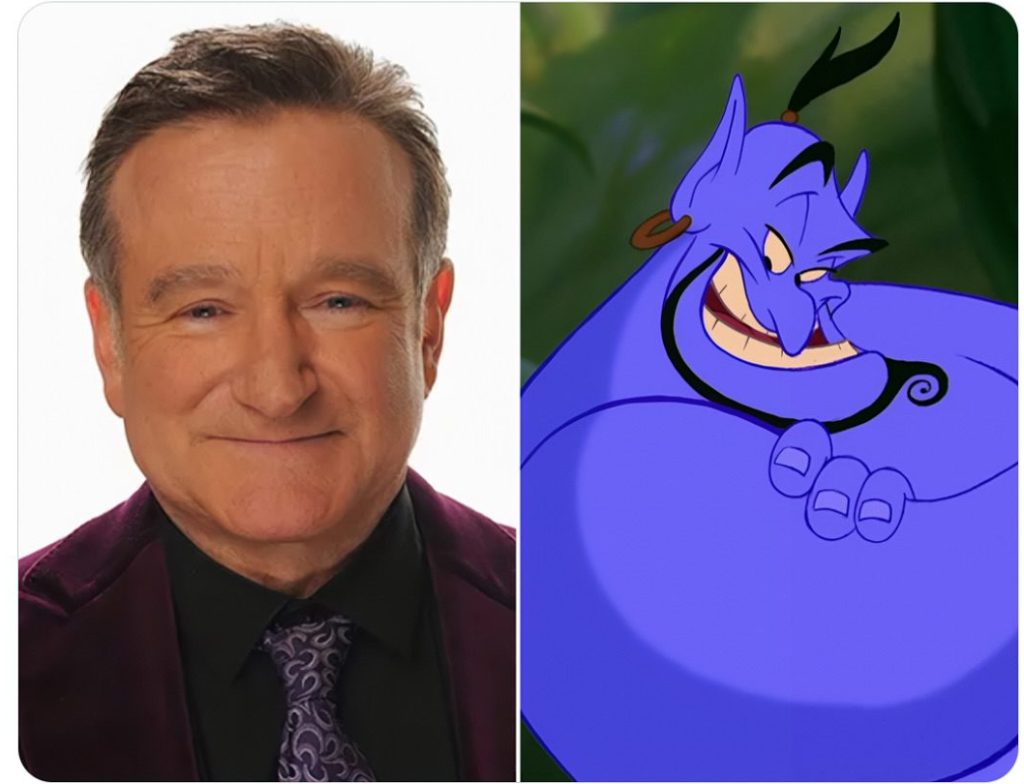Robin Williams Could Have Made $8 Million for Voicing Genie in Disney’s ‘Aladdin.’ Instead, He Took Only $75,000 to Leave Something Beautiful Behind for His Children
In 1992, Disney released Aladdin, a dazzling animated film that would forever redefine what voice acting could mean in Hollywood. At its heart was the Genie — a whirlwind of blue energy, lightning-fast wit, and deep humanity — brought to life by the incomparable Robin Williams. For millions of viewers around the world, the Genie wasn’t just a cartoon character. He was pure joy, mischief, warmth, and soul wrapped into one unforgettable performance. And behind that laughter, behind that sparkling blue figure, was a decision that spoke volumes about who Robin Williams truly was. He could have earned around $8 million for the role — a standard figure for an actor of his stature at the time. Instead, he chose to accept just $75,000. The reason was both profoundly personal and quietly noble: he wanted to leave something wonderful behind for his children.

By the early 1990s, Robin Williams had already established himself as one of the most beloved and bankable stars in Hollywood. From Good Morning, Vietnam to Dead Poets Society, his name guaranteed both critical acclaim and commercial success. Studios were willing to pay him top dollar, and for good reason — few performers could blend comedic brilliance with such raw emotional power. Yet when Disney approached him for the voice of Genie, Williams didn’t see it as another high-paying gig. He saw it as a chance to create magic. “I want to do this one for the kids,” he said in interviews later on. His own children were young at the time, and he wanted to give them something that would outlive fame, money, and awards — something filled with laughter and love.
Williams recorded his lines in marathon sessions that were unlike anything Disney had seen before. He didn’t just read the script — he exploded it. The production team famously gave him the creative freedom to improvise, and what followed became the stuff of animation legend. He reportedly delivered over 16 hours of material, ad-libbing jokes, impersonations, and entire tangents that left the sound engineers in tears of laughter. The animators then had to chase his energy frame by frame, adapting Genie’s expressions to match Williams’s mercurial voice. What emerged was a performance so alive that it redefined animated storytelling. The Genie wasn’t just funny — he was human. Beneath the humor was empathy, heartache, and a yearning for freedom that mirrored Williams’s own complexities.
For Williams, though, there was one condition. He agreed to do the role at a drastically reduced fee on the understanding that Disney would not use his voice or character likeness in the film’s merchandise or marketing materials beyond certain limits. He didn’t want his performance — something he saw as a gift — to be turned into a corporate sales pitch. “I don’t want to sell stuff,” he once said. “I want to be part of a story.” He wanted to make something pure for his kids, uncorrupted by profit motives. But after Aladdin became a global phenomenon, earning more than $500 million at the box office, tensions arose. Disney used the Genie in heavy marketing and tie-ins anyway, and Williams felt betrayed. For years, he spoke openly about the incident, emphasizing that it wasn’t about the money but about principles. “You realize when you’re doing something from the heart,” he said, “and when it’s being turned into a commodity.”
Still, time and perspective have a way of softening even the deepest disappointments. Disney executives later apologized, and relations improved. But the episode underscored how rare Williams’s decision really was. In an industry built on contracts and compensation, he had chosen meaning over money. He wanted his children — Zachary, Zelda, and Cody — to have something to look at one day and feel proud. And they did. Aladdin became one of the most beloved Disney classics of all time, and Williams’s Genie remains one of the most iconic voice performances in cinematic history. His infectious laughter, his rapid-fire impressions, his improvisational genius — all of it blended into something timeless. Even decades later, audiences still quote his lines, still smile at his jokes, still tear up when the Genie embraces Aladdin and says, “You’re free.”
Robin Williams’s journey with Aladdin is also a story about the magic of storytelling itself. It wasn’t just a role; it was a reflection of his artistic philosophy. He had always believed that comedy wasn’t about mocking others or chasing fame — it was about connection. In a 1991 interview, he said, “You’re only given a little spark of madness. You mustn’t lose it.” The Genie embodied that spark perfectly. It was chaotic, heartfelt, unpredictable, and full of wonder — just like Williams himself.
What makes his decision even more moving is that he didn’t take the lower paycheck as a publicity stunt. There was no social media then, no viral headlines to amplify his generosity. He simply did it quietly, out of love for his art and his family. He once said in an interview, “You do something that your kids will look back on and go, ‘That’s my dad.’ That’s what matters.” That sense of legacy — of creating joy for future generations — guided much of his later career. Whether it was as the tender therapist in Good Will Hunting, the desperate father in Mrs. Doubtfire, or the eccentric teacher in Dead Poets Society, he always found a way to touch hearts while making people laugh.
Even in Aladdin, between the bursts of humor and flamboyant energy, there’s a deep well of tenderness. When Genie tells Aladdin that he’s never had a friend like him, it feels sincere. Williams wasn’t just performing — he was giving a piece of himself. He turned what could have been a simple animated sidekick into a cultural icon. The Genie became a symbol of freedom, love, and friendship — a reminder that even the most magical beings long for human connection.
When Robin Williams passed away in 2014, the world mourned as if it had lost a dear friend. Tributes poured in from fans, celebrities, and colleagues alike. Disney’s official tribute showed an image of Genie with the words, “Genie, you’re free.” It was a simple phrase, but it captured everything — his humor, his kindness, and his enduring spirit. That single line echoed across social media and television screens worldwide, reminding everyone of the man who once gave up millions to make something meaningful.
His decision to accept only $75,000 might seem astonishing in Hollywood terms, but to Williams, the value of art was never measured in dollars. It was measured in the laughter of children, in the memories it created, and in the warmth it left behind. And in that sense, his investment paid infinite returns. Every time a new generation of kids discovers Aladdin, every time they laugh at Genie’s rapid-fire jokes or sing along to “Friend Like Me,” Robin Williams lives on. His voice continues to spark joy, just as he hoped it would.
Behind the microphone, Williams was more than an actor — he was a magician. He could transform words on a page into living, breathing emotion. He once said that his favorite part of working on Aladdin was that it allowed him to be “as free as the Genie.” For a performer known for his spontaneous brilliance, that freedom was priceless. In a way, Genie’s story mirrored his own: a being of immense power and heart, trapped but yearning to make others happy.
The story of Robin Williams and Aladdin isn’t just about a contract or a paycheck. It’s about purpose — about why artists create in the first place. It’s about a man who believed that laughter could heal, that love could last, and that what we leave behind matters more than what we earn. In a world obsessed with numbers and fame, Williams’s quiet choice stands as a reminder that true greatness isn’t always measured by wealth. Sometimes, it’s measured by the sound of a child’s laughter watching a blue Genie crack a joke for the hundredth time.
Even today, when fans revisit Aladdin, they don’t just hear a cartoon voice. They hear Robin Williams — the warmth, the compassion, the brilliance that made him one of the most beloved figures in entertainment history. And somewhere in that mix of humor and heart, his legacy continues to whisper the same truth he believed in: joy is the greatest gift you can give.


